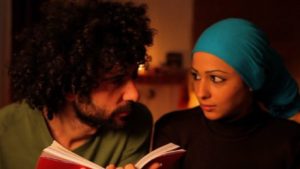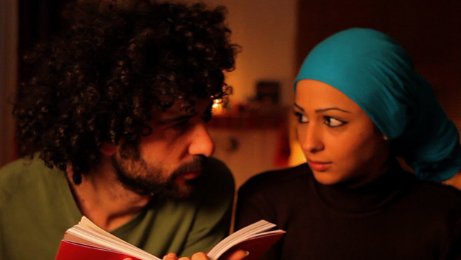Caught between a rock and a hard place, Habibi tells the morose tale of a young Palestinian couple in love against all the odds.

Inspired by the classical love story, ‘Majnun Layla’ (madly in love with Layla), Habibi is the story of a young Bedouin named Qays (Kais Nashif) whose world is turned upside down when Layla’s father (Yosef Abu Wardeh) refuses to give his blessing for his daughter to marry Qays. Set in modern day Gaza, Qays and Layla (Maisa Abd Elhadi) are students at a West Bank university who have had to drop out. Forced back home to Gaza, their relationship is doomed by Layla’s conservative family, religious zealots who want to enforce their beliefs on society and, to make things even worse, an oppressive occupation which is ever present throughout the film.
It is refreshing to watch a film from the region which goes beyond the typical story of an Israeli Jewish guy in an illicit relationship with an Arab Muslim girl. Susan Youssef presents a well-conceived narrative; Qays’ character provides delightful poetic and memorable sound bites. He is madly in love with Layla and obsessively travels to her neighbourhood each day to adorn the white walls with verses of poetry dedicated to her. When he is refused Layla’s hand, Qays asks her father why it is that he allows the occupiers to dictate how he should treat other Palestinians. Downtrodden Qays is a resident of the Khan Younis refugee camp.
Visually the film fails to excite but instead pampers us with verse. Youssef’s depiction of the Israeli occupying forces is far from flattering as is her portrayal of Hamas loyalists who espouse a rigid approach to how one should behave. The plot develops at a decent pace although some scenes do not flow on from one another. The finer details of Arab Muslim culture and social conventions are finely represented perhaps with a foreign audience in mind. On the one hand, the vulnerable and disenchanted youth who fall prey to warped zealots seeking new recruits for their cause. On the other, the conservative Middle Eastern parents who consider an ideal suitor for their daughter to possess a stable income and an affluent family background. Despite the modest production budget and disjointed scenes, Susan Youssef’s film weaves together a tragic story of heartbreak and a feeling of oppression and prejudice shattering to pieces a love that could have been.

